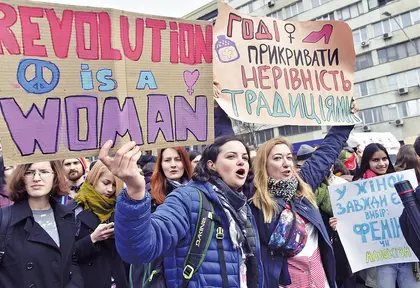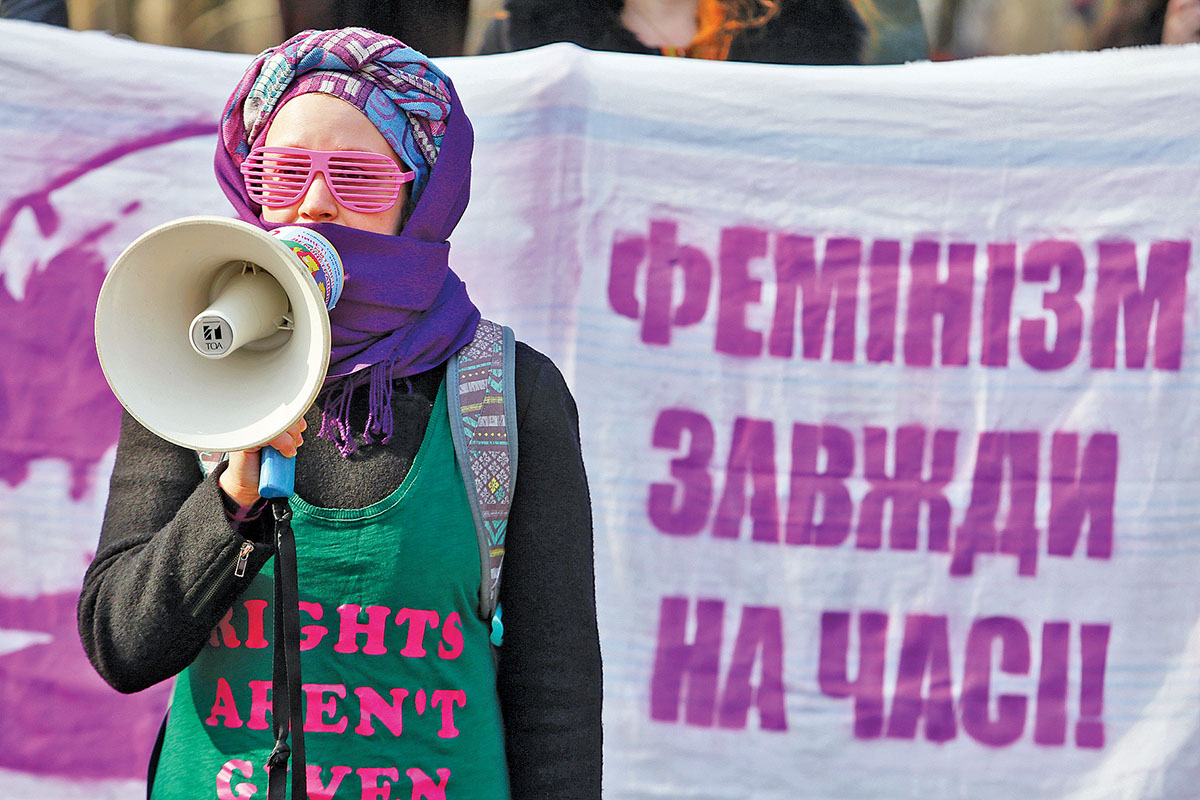Officially, Lera Burlakova was a military nurse serving on the front lines of Russia’s war in the Donbas. But in reality, she had nothing to do with medicine: she operated a grenade launcher. The ruse was necessary because, until 2016, women weren’t allowed to serve in combat positions in the Ukrainian army.
But even though the ban is no longer in place, many Ukrainian commanders remain reluctant to allow women to serve on the front line, according to Burlakova, 32, who recently retired after nearly four years of service. “They mask it as caring about women, but in fact it is discrimination,” says Burlakova. Even today, 20,000 servicewomen — some 8 percent of Ukraine’s military — are barred from being paratroopers or tank crew commanders.
The situation in Ukraine’s military reflects the general state of women’s rights in the country: not good, but slowly improving. While Ukraine is liberalizing and adopting more Western values, it is still way behind. Surveys and statistics show a harrowing picture of pay inequality, domestic violence and under-representation in many professions.
Targets for violence
The frequency of violence against women in Ukraine is alarming.
Some 600 women are killed in domestic violence in Ukraine every year, according to the United Nations Population Fund and Ukrainian Center for Social Reforms non-government organization. That is three times more than Ukraine lost in combat casualties in Russia’s war in 2017.
Many Ukrainian women conceal the violence they face at home, because of shame or dependence on the abuser. Some 120,000 Ukrainian women reported domestic violence in 2017. But Kyiv-based women’s rights center La Strada estimates that the real number is close to 2 million — or 10 percent of all women.
“Women don’t report it because they don’t believe that they will be helped,” says Olga Dunebabina, La Strada’s PR manager. “Also, pressure in society is strong. They are not supposed to ‘air dirty laundry.’”
In December, the Ukrainian parliament passed a law that broadened the definition of domestic violence to include psychological violence and violence against a partner who isn’t an official spouse. But the law will only come into force in January 2019.
While domestic violence is under-reported, rape is statistically almost nonexistent in Ukraine. In January, police opened only 30 investigations across the whole country. By comparison, thousands of rapes are reported each year in Western European countries.
“The rape statistics are incredibly understated. It’s impossible to estimate how many rapes actually take place,” says Dunebabina of La Strada. “The reported rapes are usually street attacks by strangers, while most rapes are committed by people known to the victim.”
Attitudes among women are another problem. A 2017 poll by the Ukrainian Institute for Social Studies showed that only 49 percent of women consider physical abuse at home to be a form of domestic violence. Even fewer think that insults and humiliation qualify.
Another survey by La Strada showed that four out of five police officers and judges think that domestic violence is a private matter.
Still not equal
Despite decades of living under communism, where men and women were declared to have equal rights, such equality only existed on paper.
“Women had to work as hard as men, but they also had to take care of their kids, and to clean and cook,” says Iryna Slavinska, a journalist and a coordinator of Povaha (Respect), an initiative against sexism in the media and politics. “There was no real equality.”
Ukrainian society preserved a conservative view of gender roles through Soviet rule and into modern times. Even now, the most ubiquitous substitute for “women” is “the weaker sex.”
This is reflected in workplace inequality: Women in Ukraine are paid 30 percent less than men and hold only 30 percent of managing positions in companies, according to research conducted in 2017 by several Ukrainian non-governmental organizations in partnership with the United Nations Development Program.
At the same time, there are almost as many women registered as private entrepreneurs as men.
“In Ukraine, women, almost equally with men, can run their own business, but the possibility that a woman will become the head of a company or organization is significantly lower,” the document says.
In politics, women have an even scarcer presence.
While one of the Ukrainian political heavyweights, Yulia Tymoshenko, is a woman, she is an exception. Today, there are only 53 women among the 423 members of the Ukrainian parliament — the highest number in the country’s history. Those women who make it into the parliament often face sexism and discrimination.
Iryna Suslova, a member of the Bloc of Petro Poroshenko, which has 136 seats in parliament, remembers some unpleasant treatment after joining the Verkhovna Rada in 2014. When she was collecting her fellow lawmakers’ signatures for various initiatives, her older male colleagues sometimes treated her like a Girl Scout selling cookies.
“They would say ‘I’ll sign this for you, girl, because you are so tiny with such cute big eyes’,” Suslova, now 29, recalls, adding that she had to stand up for herself and demand to be taken seriously.
According to Suslova, who now chairs the parliamentary subcommittee for gender equality and non-discrimination, Ukrainian women get used to the stereotypes and start installing glass ceilings above their own heads, giving up their career ambitions.
Rethinking Women’s Day
The changing perceptions of the role and the rights of a woman are reflected in how the meaning of the International Women’s Day, celebrated on March 8, is shifting in Ukraine.
Having been one of the major holidays in Ukraine since the early Soviet years, it started as a women’s rights day but quickly changed into a day that celebrates the traditional role of a woman — focusing on her femininity, and beauty.
Now this perception is being challenged as Ukrainian feminists try to turn the March 8 into a day to talk about women’s rights, not their looks.
Not one, but two women’s marches will take place in central Kyiv on March 8.
“We are marching to declare that the women’s rights are being violated,” says Olena Shevchenko, the organizer of one of the marches and head of the Kyiv-based LGBTQ rights organization Insight.
Shevchenko has her own story of discrimination: a former freestyle wrestler, she says she often wasn’t taken seriously as a female athlete in a “manly” sport.
One of the key demands of the demonstration led by Shevchenko is ratification of the 2011 Istanbul Convention. It is meant to help set up legal mechanisms to combat domestic and gender-based violence.
The Ukrainian parliament tried and failed to ratify the convention in 2016. The problem was that the text had references to gender and sexual orientation that conservative lawmakers, supported by the church, considered too liberal, and that could lead to the legalization of same-sex marriage.
“We need to remember about our commitments,” says Suslova. “If we have chosen a European course, we have to ratify the convention.” n
You can also highlight the text and press Ctrl + Enter





Comments (0)